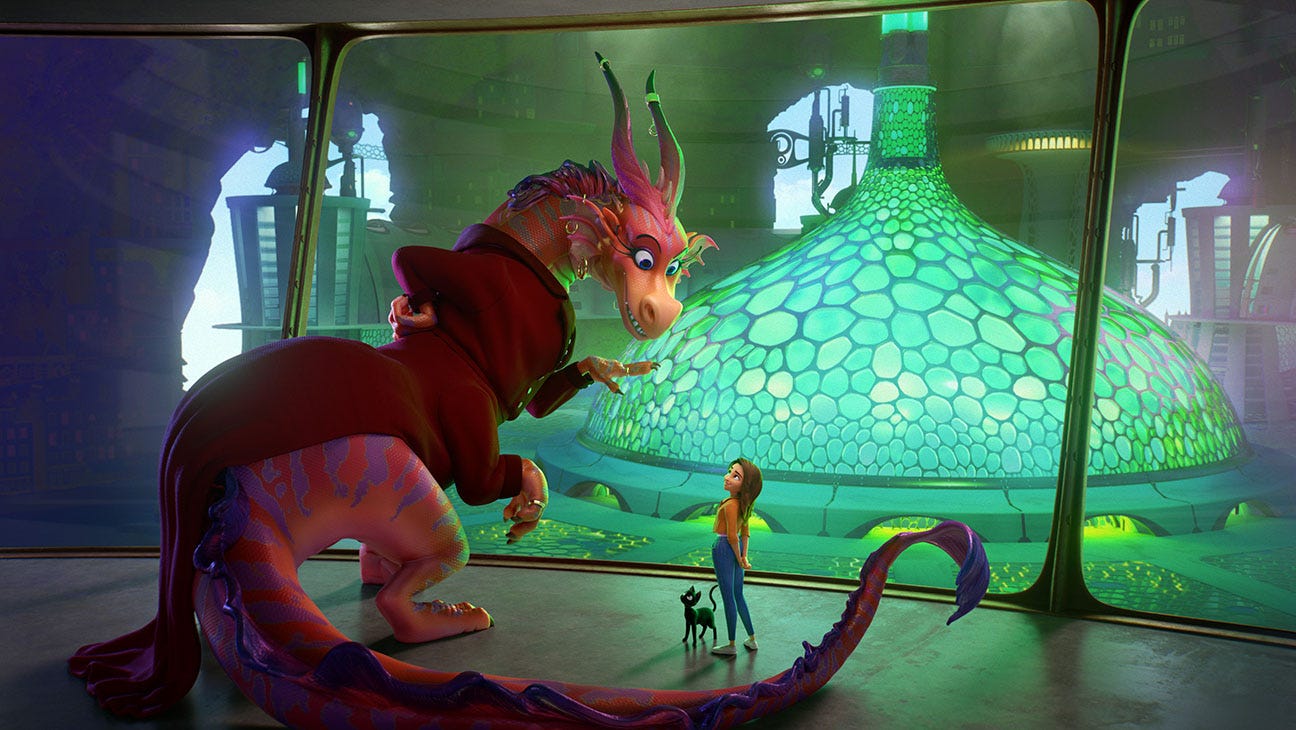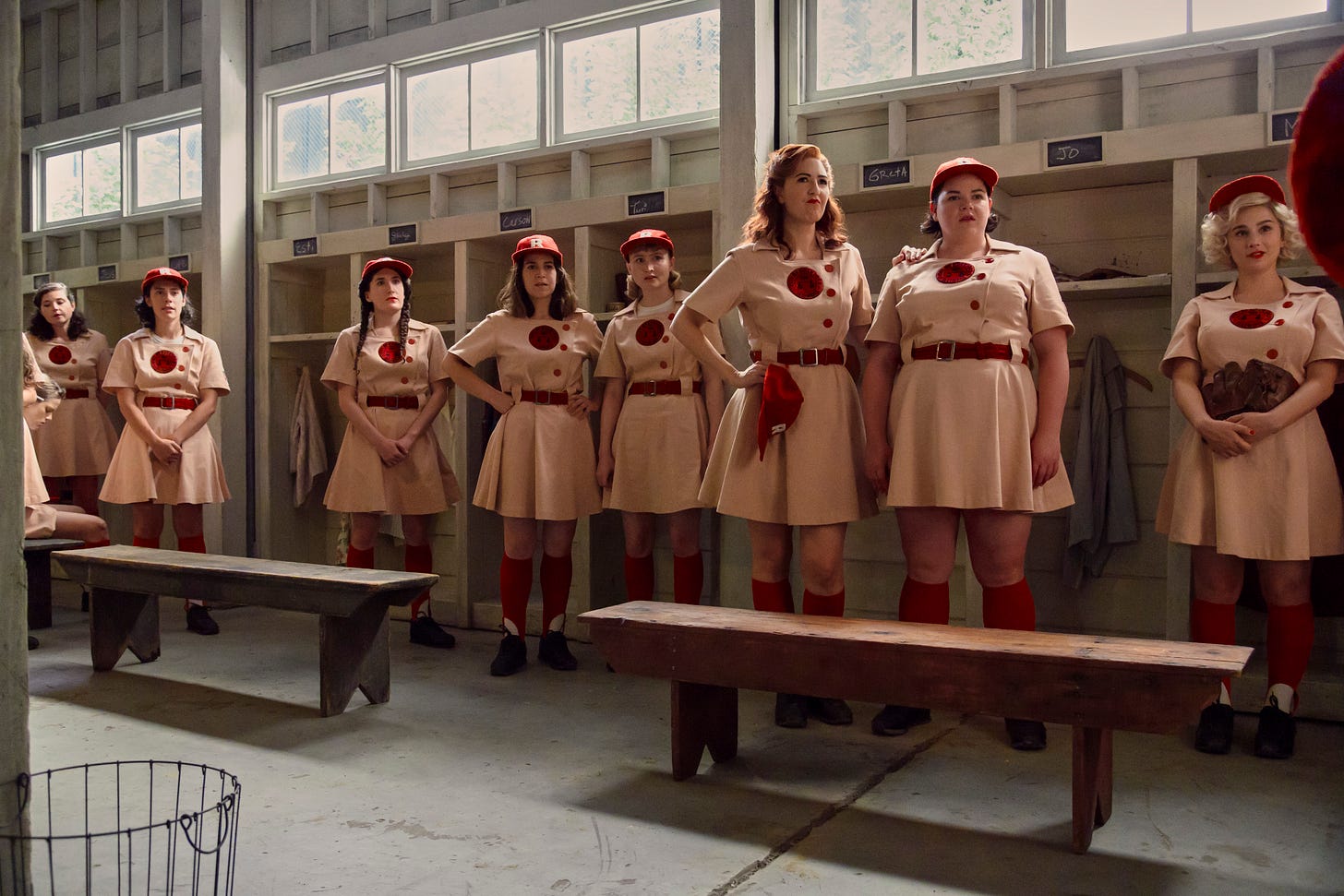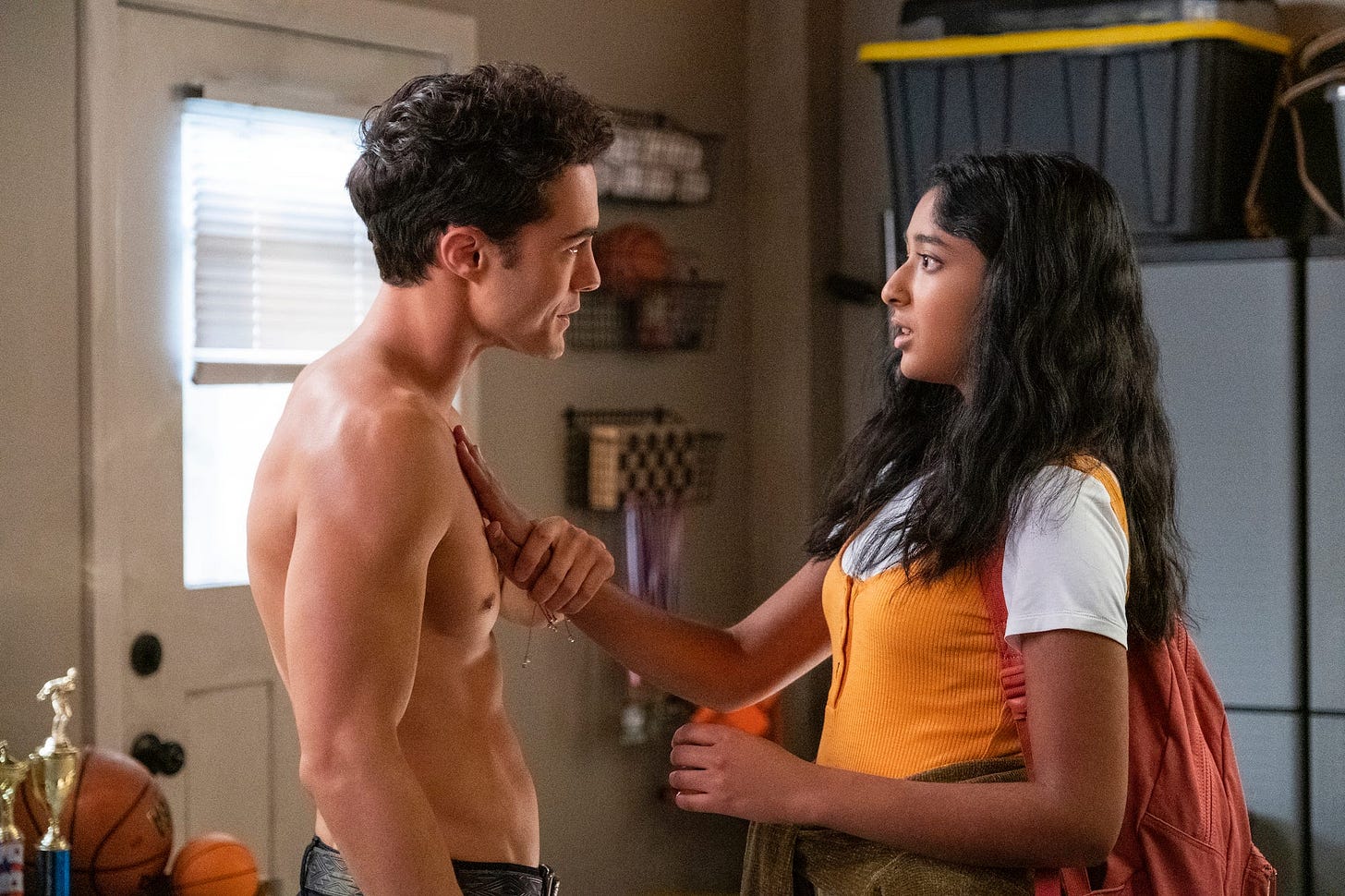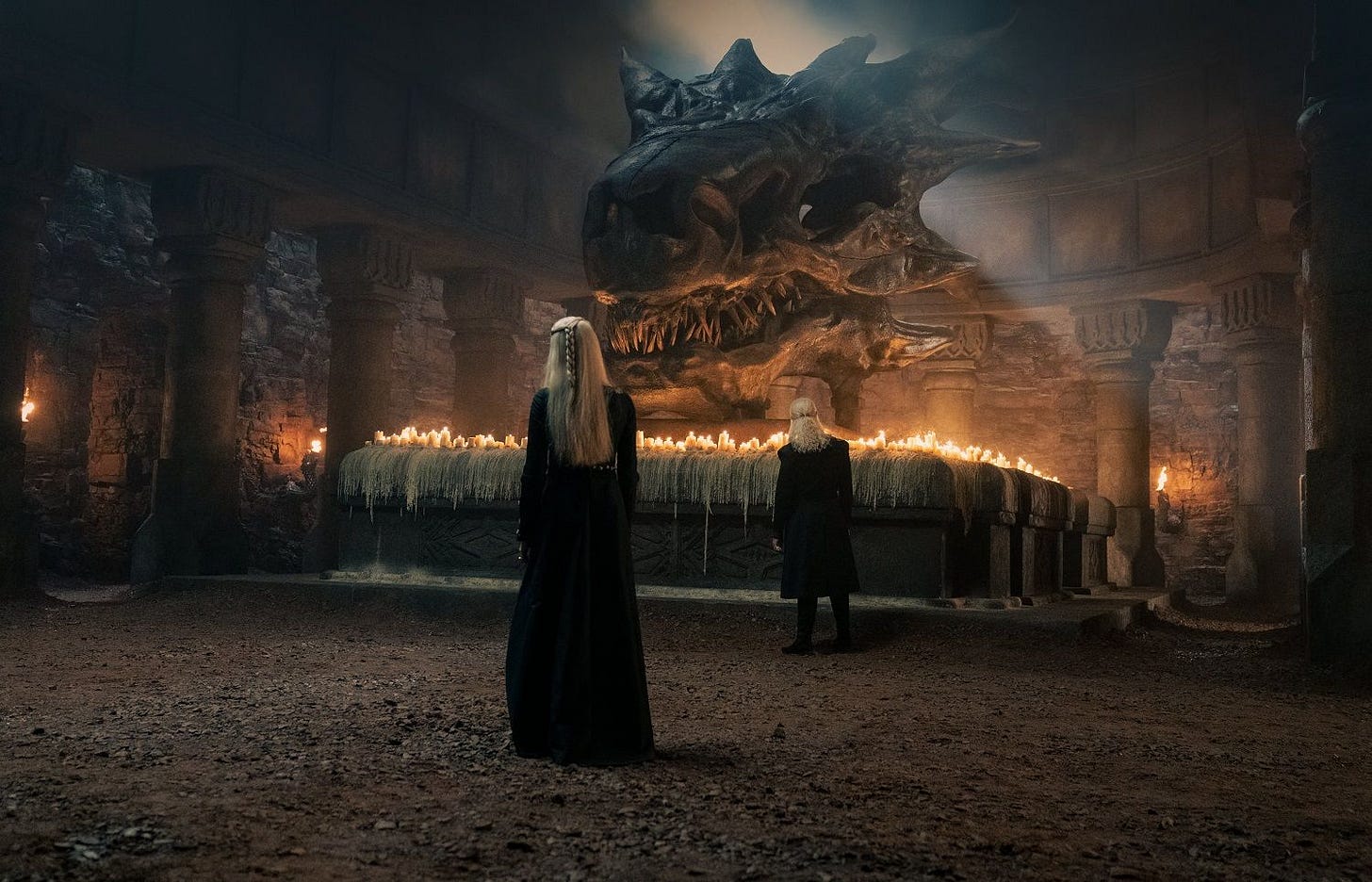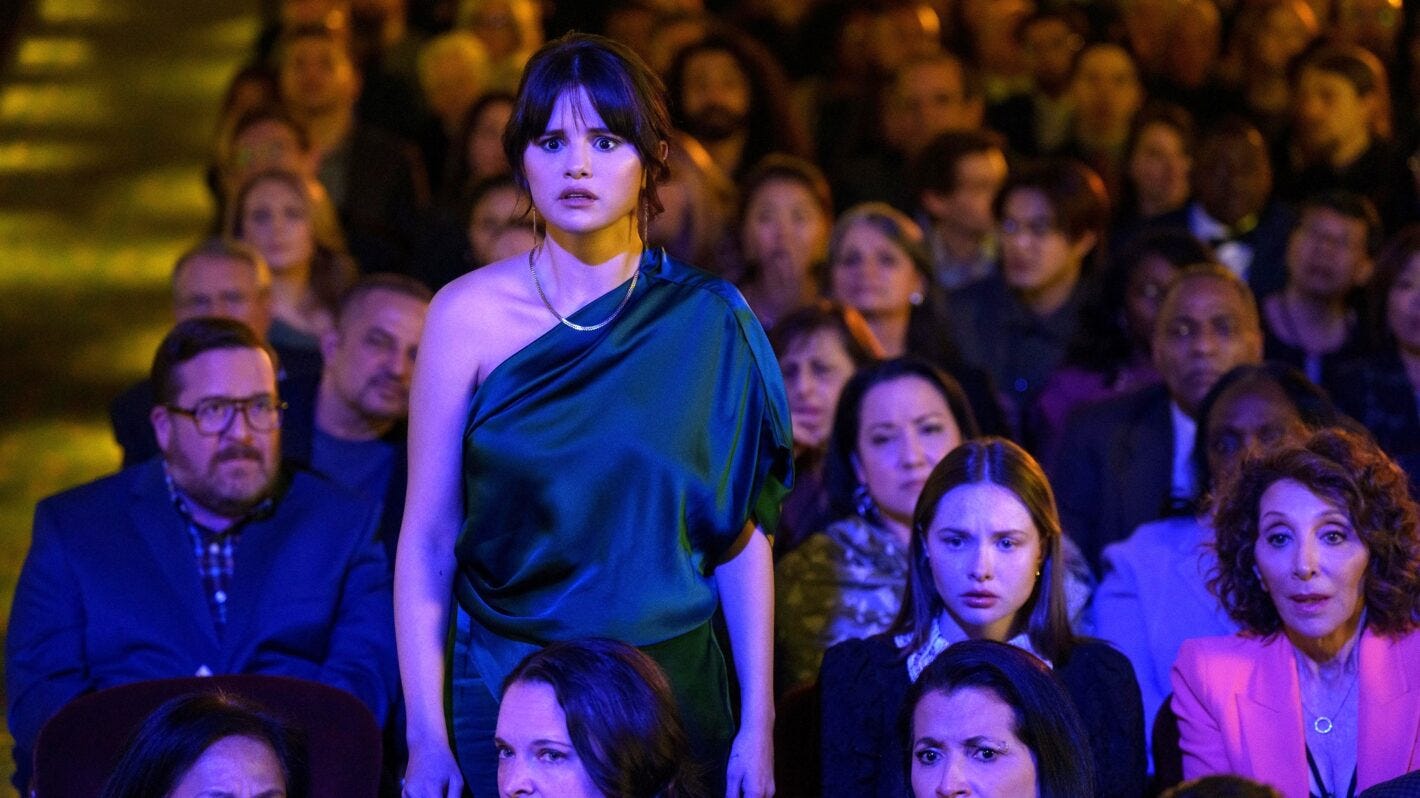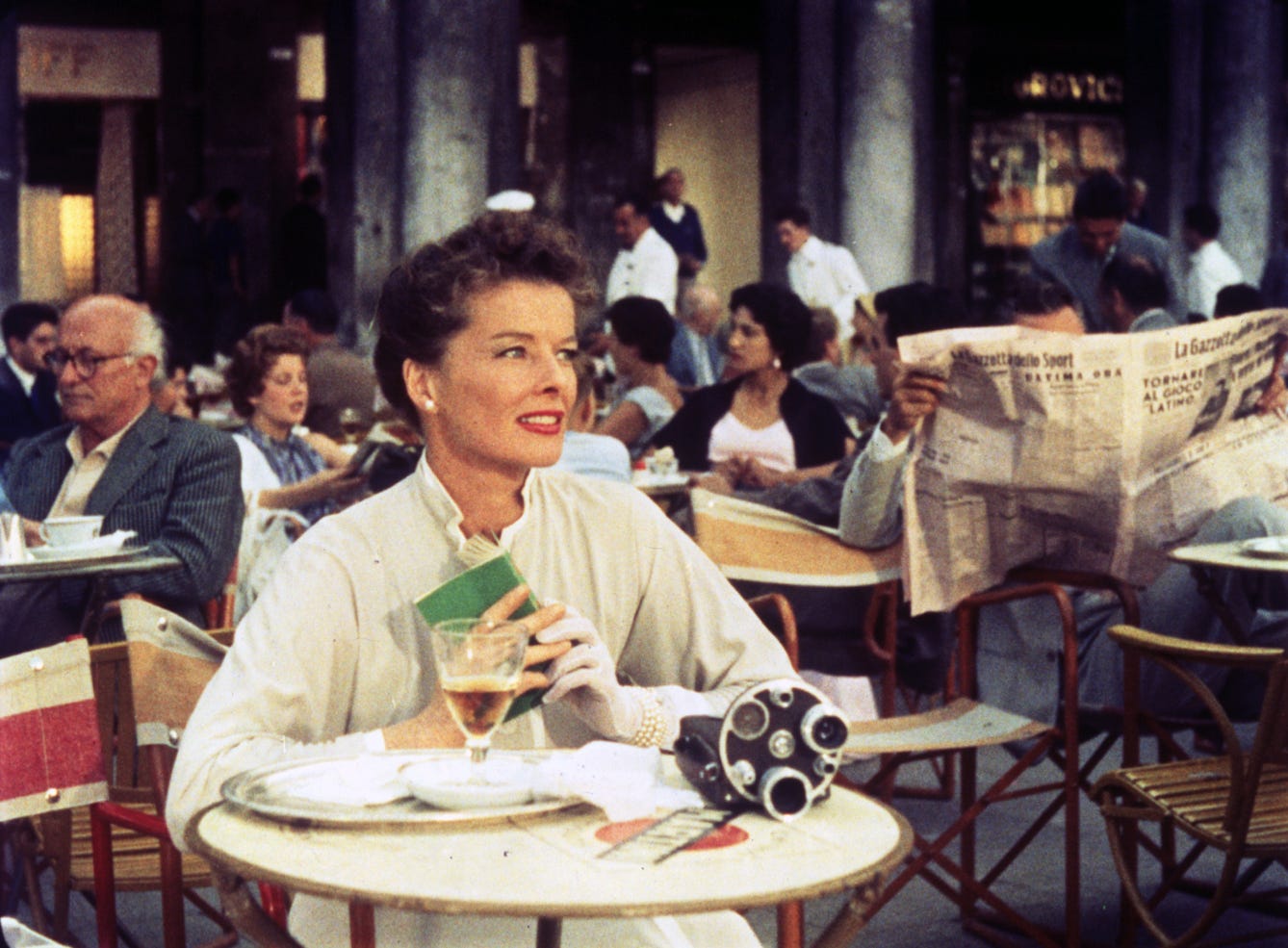The last blush of summer always feels the finest to me, readers. As August gives way to September and the last of the summer sunlight starts to vanish past the horizon in anticipation of the coming equinox, I feel the season making one final push to show itself off in its best light — not just in weather, but also in media. With the capstone on the year in television (i.e., the Emmy awards) just around the corner this coming Sunday and the final flush of the year in film (i.e., the late September-December award-contenders release season) just about to start, we’re in that rare high point of the year, readers, when television’s peak gives way to cinema’s. We have some gems to look forward to, I’m sure.
So, while we wait for many of the best films of 2022 to reveal themselves, let’s round up one of the final sets of the summer, with teas on tap including the return of a high-intensity workplace drama, the rebirth of a gendered glance at sport, and the introduction of not one but two stories featuring dragons.
Enjoy! ☕️🫖🐉
Industry (Season 2 Premiere)
HBOMax • Drama • Stocks & Bonds
Synopsis
Employees at the London office of an international finance company contend with the grim visage of a success constantly underscored by its costs.
My take
“O, I’m sorry — did you need someone to hold your hand?”
HBOMax’s high-intensity import from the U.K., Mickey Down and Konrad Kay’s vicious Industry, slit my throat during its feverishly tight first season — and I only begged for more. Still under the radar (and disappointingly slated into a somewhat less than prestigious Monday night slot on the streaming service) for its sophomore season, the series continues to deliver the sleek yet uncomfortable social and economic commentary it used during Season 1 to win my affection. Onto that solid first layer, the narrative this season specifically adds interesting growth opportunities and character-consistent challenges, remarkably for everyone in its relatively large and diverse cast.
To wit, readers, the size and the diversity of the cast are one large reason I was initially drawn to the series. An ensemble drama by construction, Industry on paper reads like a release by Robert Altman: More than five intricately counter-opposed parties converge and diverge in a nuanced dance, as they each try to accomplish their complex goals. Albeit here populated almost exclusively by sophisticate twenty-somethings, fresh from university — a characteristic better known from the work of Whit Stillman than ever from the work of Robert Altman, a contrast that, now that I think about it, presents two distinct yet not inconceivably marriageable styles — still the series promised an interactive human network strung at a level well beyond the simple first notes of the novice sitcom. or the novelty drama.
Looking deeper, I saw that not only could the series deliver on that first promise but, unlike in a true Altman, in Industry the focus also isn’t the sprawling frisson of humanity in amalgam at the story’s approximate center, but instead the emergent phenomena from that dynamic social network: the morality of the good, the product of justice taxed by ambition, the value of talent and its definition, the definition of succeeding and by necessary contrast the definition of failure… These weighty concepts are the hydraulic engine of the series, both its means and an end in and of itself, turning and grinding the gears of the characters and their circumstances for and against each other, ultimately to take us in the audience somewhere we didn’t or needn’t expect. That the exact details of the characters’ circumstances are, for many viewers I’d expect, rarefied spaces (e.g., elite drawing rooms, underground clubs, gated universities, steel- and glass-framed trading room floors) only glazes that fundamental interest with style.
Ultimately, readers, I’d say, if you ever enjoyed Chandor’s (2011) Margin Call or if you were ever a fan of the aesthetic and dialectic of HBOMax’s other wealth-driven modern drama, Succession (Armstrong [creator], 2018-Present) — especially if you ever wished Succession were less The Lion in Winter (Harvey [dir.] & Goldman [wri.], 1968) and more Gossip Girl (Safran [developer], 2021-Present) — then you’re apt to also like Industry.
Whether it’d be worth watching regardless of your viewing history, my answer is firmly yes.
Temperature check
Hot
Luck
Apple TV+ • Animation • Fable
Synopsis
A hapless young woman finds a token of unyielding good luck and must face the consequences of her discovery.
My take
I was honestly hopeful that Apple TV+ would deliver an amazing animated feature-length film this year, as it did in 2020 with WolfWalkers (Moore, Stewart [dir.], & Collins [wri.], 2020), my pick that year for outstanding work in the category. Unfortunately, what Apple TV+ has delivered this year instead is a Dreamworks knock-off product, a highly regularized and altogether unremarkable straw man of a plot — ripped plainly from the premise of the prologue of Tim Burton’s (1993) The Nightmare before Christmas — without even the decency to visually dazzle with the quality of the film’s animation or special effects. For a cheesy run-of-the-mill entertainment in which Jane Fonda voices a large purple dragon, look no further.
Temperature check
Cold (nearly freezing)
A League of Their Own (Season 1)
Amazon Prime • Historical fiction • Sliders
Synopsis
Drawn from their otherwise everyday lives in nearly every corner of North America, athletic women compete for the chance to delight wartime audiences in baseball.
My take
Attractive costumes and make-up bedeck this new period piece, reviving and revising the classic 1991 film of the same name, A League of Their Own, the story of the women who became players in the first and only American women’s baseball league during World War II.
What the series has in looks, however, it lacks in substance. How can A League of Their Own expect us to take it seriously, when it doesn’t fully take itself seriously? Yes, the series actively criticizes through its text the forced gender-norm conformity endemic in the corporate machine producing the women’s league — a machine that for example made it compulsory for its female players to not only wear skirts during professional play (a notable hazard to sliders and other run-of-the-mill plays, not to mention a buzzard for crouching catchers) but also look conventionally attractive to viewers at all times — but then the series also becomes complicit with that forced conformity as a disadvantaging bias by not making inventive choices in its own storytelling. For prime example, rather than follow the stories of all the women seen and considered for the league, regardless of their ‘official’ success there, the series follows instead only the storylines of those women who were feminine enough to “make the cut.” I suppose, this omission of all the women whom society and the league deemed aesthetically beyond help enough to dismiss from playing baseball does pertain to only the white players; the B storyline of the series does follow the journey of a single Black female pitcher and her quest to be recognized and appreciated for her talents in any formal baseball organization. Still, as I’d bet you’d agree, readers, subplotting on the side one marginalized community member’s story is not a free pass from excluding others’ from what’s supposed to be an inclusive history. I for one would have recommended a riotous applause for an alternative version of this series, one that sought to break exclusivity not simply by foregrounding tepid and tame lesbian love stories during the relatively socially conservative 1940s but moreover by elevating from the shadows all those stories of women skilled enough to play but not fortunate enough to be hired as players. That kind of history, oblivious to rather than complicit with the motivations of the heavy-handed authors of history who by their actions at the time meant to choose what the ‘good’ people of society could ever come to know, would have set the series into a true league of its own, while all we have now instead is a half-unveiled attempt at a retelling no one asked for, needed, or feels is truly sensitive enough to praise.
Temperature check
Cold
Never Have I Ever (Season 3)
Netflix • Comedy • Going-on of Age
Synopsis
Having finally started the relationship of her dreams, a high school junior suffers the vice of her inner saboteuse: constantly finding ways to strike down her bids at happiness.
My take
The once avant garde comedy Never Have I Ever, about a teen-aged wannabe of Indian descent, has completed its transformation into a humdrum sitcom., in which stakes and opportunities are never real and everything always inevitably resets itself back to its first position (notably, in the emotional and social development of each character). Save perhaps a faint teaser of a brighter horizon quickly waved away in episodes 8-10, Season 3 has me asking, Never have I ever… liked this series?
Temperature check
Cold
House of the Dragon (Series Premiere)
HBOMax • Drama • Sex Rules
Synopsis
Questions of inheritance plague the silver-stranded ruling family of a medieval society.
My take
In a post-show document interviewing show writers and directors as well as other cast and crew members, HBOMax claims that its new reboot of the Game of Thrones (Benioff & Weiss [creators], 2011-2019) world, House of the Dragon, is not a “prequel for prequel’s sake” but instead a purposeful, thoughtful return to Westeros. I suppose that it’s quaint that the production company and streaming service thinks that it’s currently investing hoards of money into this new series and the litany of ads promoting it simply for the storytelling art of the drama. I mean, OK, sure: After the extremely lackluster final seasons of the once must-see-TV original series Game of Thrones, I’d have bet that no one in the HBOMax offices was going to be quick to throw more money onto the fire that was the outpouring of negative reviews from both TV critics and at-home viewers alike. Negative sentiment was just way too high at the time, for even a glimmer of the world’s revitalization. However, I’d also have bet even at that time that there was no way at all that we at home weren’t going to eventually see the bricks of the Red Keep, the sweep of a dragon’s wing, and the scourge of the Iron Throne again on an extension of that original series, once the production team at the HBOMax offices finally figured out the “right angles” from which to reïntroduce those details to the public and finally believed again, once enough time had passed since the airing of the original series, that a hunger for those details might possibly loom larger than any irritation by them. Readers, it seems, that long-awaited time is now — and the “right angle” they’ve landed on? Girlbossing.
Yes, indeed, HBOMax has placed this new and clearly expensive venture squarely on the mantle of a now largely derided pop-cultural trend off-shooting from the present-day construction of feminism. Taking notes from Frozen (Buck [dir.] & Lee [dir./wri.], 2013) and perhaps also from the real history of the Tudor dynasty in England, House of the Dragon begins with the somewhat formulaic anti-position of a brutality-embracing male primogeniture against the softening reality of there being only a single and female heir: here, a (relatively) emotionally intelligent young woman with a fondness for riding. While this feministic premise recommends that the position of highest leadership in all of Westeros indeed be occupied by this young woman and comments critically on the biased assumption that the proper battlefield of any woman is not in politics or in actual warfare but rather in the marriage bed, it nevertheless also suggests that the balancing force that the system stabilizing the world of Westeros now most needs is the softening touch of a crucially feminine leader — or, in other words, for a woman to succeed in leadership in strictly “womanly” ways. This philosophical starting point is notably different from the starting point that Game of Thrones set for its own silver-stranded royal heiress, a young woman who earned thunderous applause both on and off screen during her quest for the Iron Throne because she explicitly made no attempts to stay within the proscribed lines around her gender. In this new series, contrarily, we have no evidence that our would-be heroine will ever be a parallel breaker of chains. No, despite sharing the same silvery blonde locks and the same adeptness with dragon riding, this new girl who could be Queen is no Daenerys Targaryen, despite the continuity of their in-show lineage. Of course, we’ll have to wait and see how this new set-up fully plays out; perhaps this new character will shed the proscriptions she appears primed to obey. However, at least in outlook now, even in the series’ technicolor brilliance, the prospect of such a welcome reprieve feels dim.
Temperature check
Tepid
Only Murders in the Building (Season 2)
Hulu • Comedy • Capers Capers Caper Caper
Synopsis
Motley podcasters deduce ‘who done’ the second surreptitious murder in their historical Manhattan apartment building.
My take
The zany and unlikely inter-generational comedy that helped the first season of Only Murders in the Building acquire an audience off the backs of the Boomers and Gen-X-ers who remember the heydays of Steve Martin and Martin Short and the Millennials and Zoomers who know the early work of Selena Gómez rears its hydra-like head again for round 2.
Paced extremely unevenly, this second attempt at whipping up a murder-mystery told with haphazard aplomb feels wearying throughout, despite the enhanced budget and attention that the first season’s Emmy acclaim clearly has lavished upon the casting and the production design. As much as beautiful apartments, secret passageways, and Amy Schumer and Shirley MacLaine thrill me, readers, I wasn’t really invested in the events of this season — and perhaps, it seems, the writers really weren’t either. How else can we understand the early introduced and then quickly vanished subplotline tying Short’s character to Schumer’s? And, for that matter, how else can we understand the pizzazz-riddled nearly deus ex machina ending wherein suddenly, without much clarity, the protagonists solve the very convoluted murder at the heart of the season? Entire pages seem torn out of Dan Brown’s “Writing for Thrills.”
I wish I could say, “Well, at least it’s concluded,” but the season’s ending is only yet another absurd beginning, teeing up — spoiler alert — a third murder (this time outside the apartment building) for the motley armchair investigators to crack next summer. As Gómez’ character rightly exclaims in the scene containing the above still, woe to everyone involved.
Temperature check
Cold (despite infrequent semblances of lukewarm passages)
Locke & Key (Final Season)
Netflix • Drama • Healing trauma
Synopsis
The accidental return of two demonic foes catalyzes a final reconnection for the members and residents of Key House.
My take
After the dyspeptic shenanigans of its second season (my take here), Netflix’s YA fantasy series Locke & Key returns for its third and final season with, frankly, (1) an aggravating and sophomoric admonition of its audience under the guise of wholesomeness and family-centric feelings and (2) an oblivious rush past its only interesting subplot, a potentially milestone discussion on consent.
It’s true: Rather than offer a thoughtful critique on what to some viewers might look like grey areas in soliciting, acquiring, and honoring another person’s consent, Season 3 prioritizes and promotes an apologist’s narrative, tantamount to arguing that violent video games make (especially young video-game) players violent. Corruption is not an inescapable future for anyone who so much as brushes by the opportunity to act selfishly, technology is never so unwieldily powerful that it must be used by no one rather than be used responsibly with safeguards by a few, and turning away from one’s authentic idiosyncrasies for the sake of leading a “normal life” is not the road to happiness. The only thing that is clear in this season is that the writers don’t know any of those things, plus what constitutes a breach of consent. (Hint: Repeatedly asking someone who has already given you a considered “no” to reconsider and then seizing on any weakening of resolve to press for a different answer, especially when the would-be consent giver is actually just intoxicated, are distinctly unwholesome, family-acentric malpractices.)
Several people were clearly asleep at the wheel, steering this once sparkling vehicle into its final port. Our only consolation? We won’t have to further suffer the junking of the vehicle for any more episodes.
Temperature check
Cold
Retrospective
Summertime (1955)
HBOMax • Drama • Beauty Comes, Beauty Goes
Synopsis
An American tourist finds unexpected yet deeply desired connections on her first trip to Venice.
My take
Seven years before David Lean directed Peter o’Toole in their magnum opus Lawrence of Arabia amidst the sands of Africa, he sauntered with Katharine Hepburn down the canals and tiny streets of Venice in their charming American travelogue, Summertime. A very different take on the people of the Italian peninsula from those coming out of Italy itself at the time (e.g., Fellini’s [1963] 8 1/2, de Sica’s [1960] La Ciociara), the film extols the painful contentment of being an adult open to experiences, both the good and the bad, especially while one is very far from home.
Hepburn plays an American adventurer, hoping dearly for “a wonderful, mystical, magical miracle” to occur to her while on a life-culminating vacation in Italy. The rich hues and careful expressions she decorates across her performance reveal her talents in spades for not only acting but also feeling her characters, both for their strengths and their weaknesses. As her character here obliquely admits, the wretched beauty of trying to learn about oneself and “to find what she’d been missing all her life” is the story here — and, unlike later stories that reach for the same bar (e.g., Well’s [2003] Under the Tuscan Sun, Ackerman & Sherman’s [2003] The Roman Spring of Mrs. Stone), here Lean is careful to not let the dazzle of the Italian sunlight on the water overrule him or the majesty of the Italian landscape distract us from what’s really in focus. No, Lean holds both elements of context here in tight tension, serving and supporting Hepburn’s character’s story without prohibiting us as viewers from drinking them in as she does, for flavor.
Really, readers, apart from the pair of scenes in which Hepburn’s character willingly abets two very young boys in smoking (#DifferentTimes, #AmIRight?), I’d be hard pressed to find as charming a late summer romance — in all the meanings of that phrase — as this one.
Temperature check
Hot
Thanks for reading Rich Reviews! Subscribe for free to receive new posts and support my work.





